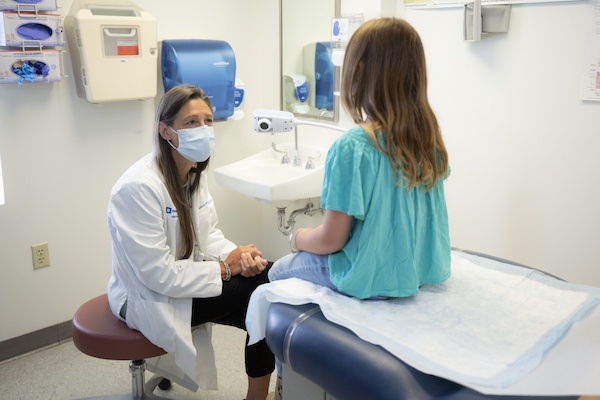Duke gynecologist one of few in NC with focused practice designation

BY LORI MALONE
DUKE HEALTH CLINICAL PRACTICE TODAY
For young children and adolescents with gynecologic conditions, it can be challenging to find a pediatrician or adult gynecologist with the specialized training and experience necessary to accurately diagnose and treat conditions in this specific age group.
With the recent arrival of Jennifer O. Howell, MD, Duke now offers treatments for gynecologic issues in children from birth through age 21 at Duke Women’s Health Associates Arringdon in Morrisville and Duke Women’s Health Associates at Patterson Place in Durham.
Dr. Howell, who previously practiced at Rex and UNC clinics in the Triangle area, is one of the few gynecologists in North Carolina with a focused practice designation in Pediatric and Adolescent Gynecology from the American Board of Obstetrics and Gynecology.
Pediatric gynecology
Dr. Howell says that pediatricians may not be trained to recognize and address the unique gynecologic issues that can affect children at birth and at young ages. Common conditions include:
• Congenital abnormalities of the genitalia or in the reproductive tract, including vaginal agenesis
• Chromosomal abnormalities, including Turner syndrome – a condition in which a female is partly or completely missing an X chromosome
• Labial adhesions, which obstruct the vaginal opening and cause difficulty urinating
• Prepubertal vaginitis
Many parents of young children worry about gynecologists using an intravaginal device such as a speculum for an examination, but “at Duke, an awake child would never receive an invasive examination that could cause pain,” says Dr. Howell. “We have ways of making diagnoses without the use of intravaginal devices and can perform an examination under sedation if necessary. A gynecologic exam for a young child is not as intimidating as parents or providers might think.”
Adolescent gynecology
“Teenagers are not little adults,” says Dr. Howell, “and our practice is finely tuned into the different factors involved in diagnosing and treating adolescents.” For example, she explains, young girls with abnormal bleeding usually don’t have structural issues such as fibroids or polyps and rarely need speculum exams; their issues tend to be hormonal in nature. Common conditions include:
• Amenorrhea and dysmenorrhea
• Endometriosis and pelvic pain
• Adolescent gender care, including hormone therapy
• Fertility preservation associated with complex medical conditions
• Sexually transmitted disease and infection screenings
An often-overlooked aspect of treating adolescents is knowing their social history, according to Dr. Howell. “I interview adolescents over age 13
without parents and take a closer look at their social situation than an adult gynecologist normally would,” she says.
Dr. Howell uses an adolescent social history methodology known as HEADSS (Home, Education/employment, peer group Activities, Drugs, Sexuality and Suicide/depression). “These factors can play into the reason an adolescent is having gynecologic problems,” she says.
Patient referrals
Dr. Howell encourages providers to refer children and adolescents to Duke for any gynecologic concern, noting the wealth of subspecialists for many uncommon conditions and the convenient community-based clinics that help parents avoid navigating large hospital-based clinics.
“We also have a clinical navigator to help ensure good communication with referring providers so they can stay involved. All of this demonstrates Duke’s commitment to the community in terms of making sure specialty services are available and easily accessible.”
Learn more: Treatment for Müllerian Anomalies at Duke Ob/Gyn